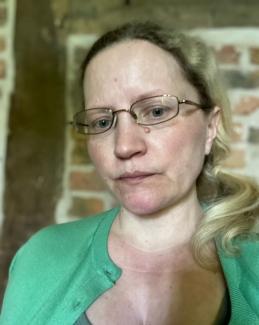Dianne Bain, 47 from Powys was healthy and fit until COVID-19 struck and left her barely able to work and enjoy life.

As a mother of three boys, Dianne was used to juggling family life with a busy job as a Lettings Officer, hiring out facilities and orgainising events in a school in Shropshire. Diagnosed with type 1 diabetes when she was 12 years old, she knew what to do and barely ever needed to go to the doctors.
In April 2020, she woke up one day with a fast heart rate and suddenly started feeling very sick, with a terrible headache and confusion, which made her husband think she was having a stroke. She doesn’t remember what happened, but woke up in hospital with encephalitis, an uncommon but serious condition in which the brain becomes inflamed.
She returned home a week later but continued to feel ill. Her headaches worsened and she suffered dizziness, rashes, hallucinations, loss of taste and smell, fatigue, aches, and much more. When vomiting led to another spell in hospital in May 2020, she tested positive for COVID-19.
Dianne said: “Because I didn’t have any breathing problems or a fever, COVID-19 wasn’t considered as being linked to the encephalitis. The doctors at the hospital thought that the problem was related to my diabetes and that was put on my record, which made feel very upset and misunderstood, as I always worked hard to manage my condition. That experience was a terrifying ordeal, and it was only the beginning of a horrible year”.
After being hospitalised another two times for a kidney stone and vomiting, Dianne has been diagnosed with Post-Covid Syndrome. “After all this time, I’m still struggling. I’m doing just one day a week at work but even that is really draining me. Some days I’m okay but it’s like having a hat of symptoms and you get to draw ones out each day. It can be exhaustion, chest pain, sore joints, lack of balance or vision impairment”, she added.
Having now receiving both doses of the COVID-19 vaccine and because she lives in an isolated rural area, Dianne feels now less worried about the pandemic but believes more support is needed for people living with the debilitating after-effects of COVID-19.
Dianne explained: “The care I received from my GP, who diagnosed me with long Covid, and my Diabetes Team has been exceptional. The diabetes nurse giving me a glucose monitoring sensor has been a positive change as my bloods are very changeable since I started suffering with long Covid and it helps me control them. I also found a good support network in the Long Covid Group in Wales, but we still desperately need more research and proper, dedicated long Covid clinics as there is little GPs can do.”
This week, the Welsh Government has announced a package of measures, which aims to expand the diagnosis, treatment, rehabilitation and care for those with lasting COVID-19 symptoms. There will be a new patient pathway called Adferiad (recover) to speed up referrals. In March, the Welsh Government updated their Written Statement on long Covid.
NHS Wales is also encouraging people with long Covid to access a Recovery app, developed by the NHS Wales respiratory health group on behalf of the Welsh Government. It's a bilingual tool with more than 100 videos and links to advice where people can record their symptoms, track their progress and learn to manage their condition. It includes advice from therapists, psychologists, dietitians and consultants.
Dai Williams, Diabetes UK Cymru’s National Director said: “Covid-19 is a new illness, and we are still researching how it impacts people with diabetes. It’s positive that in Wales, post-COVID syndrome is recognised. We welcome this new investment and hope to be engaged in the new services to tackle clinical needs for people with Long Covid living with diabetes. It’s clear that more needs to be done to support those who are hit hard by coronavirus and suffer with lingering symptoms, on top of diabetes, which makes them even more vulnerable”.
A recent survey from the Office for National Statistics estimates that more than 50,000 people in Wales suffer from long Covid. Symptoms include difficulty with breathing and tiredness which can last weeks to months after the virus has first appeared. Generally, around 1 in 10 people who have had coronavirus suffer some long term symptoms.
Our research has been looking into the possibility that Covid-19 can cause diabetes or make it worse but little is still known about how people with diabetes are being affected by Long Covid.
If you live with diabetes and have been suffering with Long Covid in Wales please contact us at wales@diabetes.org.uk
